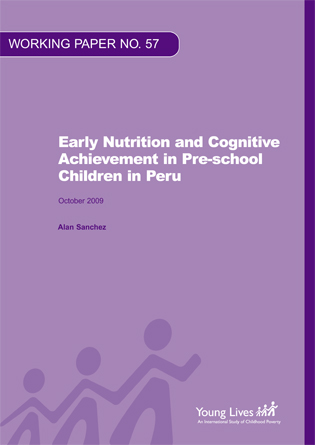Early Nutrition and Cognitive Achievement in Pre-school Children in Peru
| Año | : | 2009 |
|---|---|---|
| Autor/es | : | Alan Sánchez |
| Área/s | : | Educación y aprendizajes, Pobreza y equidad |
[2009] SANCHEZ, Alan. Early Nutrition and Cognitive Achievement in Pre-school Children in Peru. Oxford: Young Lives. Working paper, 57. 32 p.
This paper examines the relationship between early stunting and later cognitive achievement. The data were collected at two points in time, once in 2002 when children were 6 to 20 months old, and again in 2006-7 when they were 4 to 6 years old. The sample includes 1,963 children from three geographical regions: the Pacific Coastal, the Highlands, and the Amazonian Jungle. Height-for-age was used as an assessment of early stunting. The Peabody Picture Vocabulary Test was administered to collected standardised scores of cognitive achievement. Ordinary Least Squares was used to analyse the data, controlling for lagging children (those who were younger by a number of months) and household and community characteristics. One of the aspects of this study that distinguishes it from others on nutrition and learning is that these children were of pre-school age, and therefore the length of time spent in school is not an influential variable to consider.
The results show that the link between early malnutrition and later cognitive outcomes is already established and observable by the time that children are of pre-school age. This finding remains robust after a number of control variables have been accounted for. The study also produces evidence concerning climate, early nutrition, and early cognitive achievement. There is a clear link between exposure to cold weather at an early age among children in the Andean highlands and later cognitive outcomes. These results provide additional evidence to the substantial body of literature regarding malnutrition and cognitive outcomes. It also offers an important contribution concerning the influence of location and climate for malnutrition in young children.






